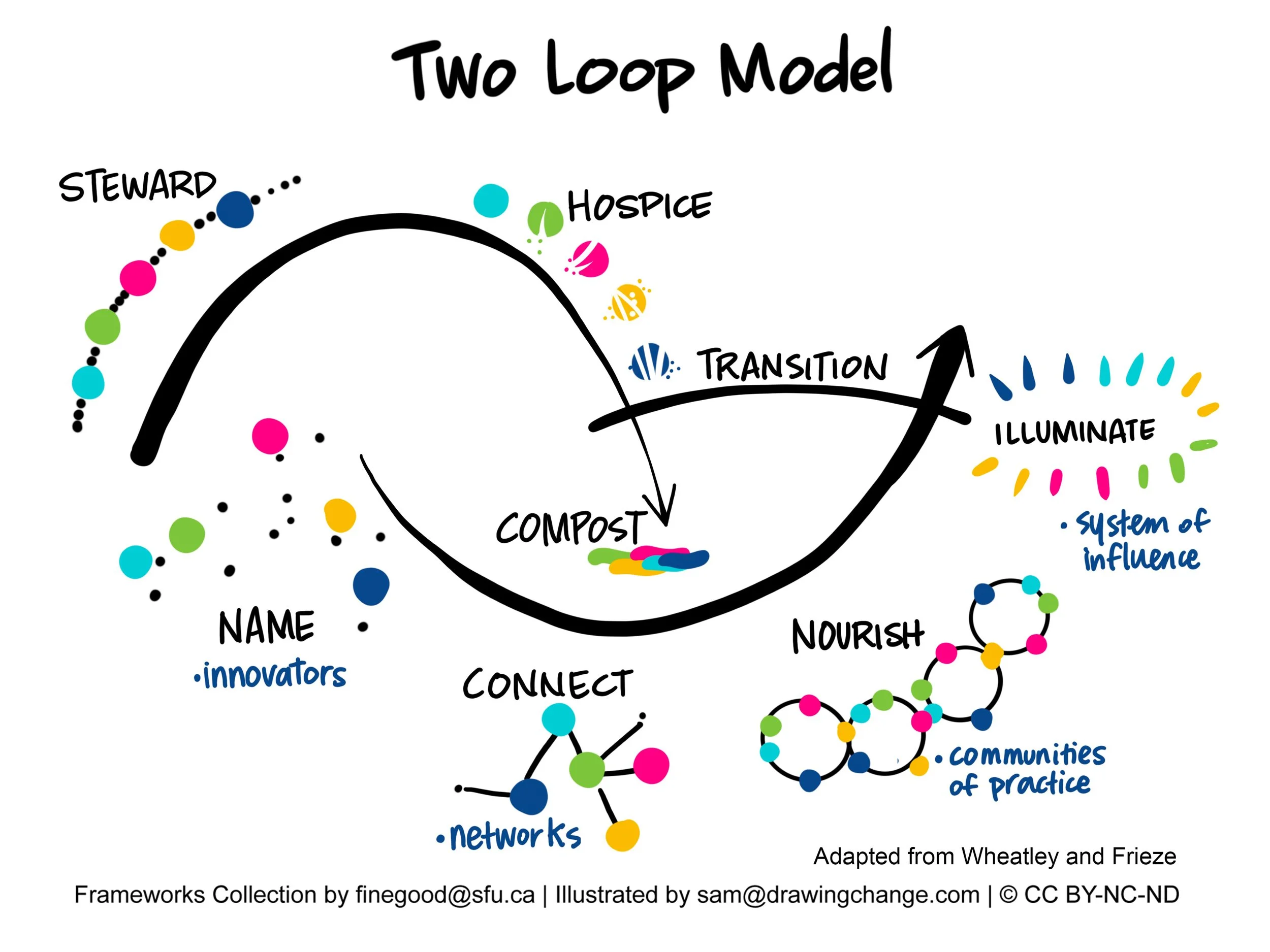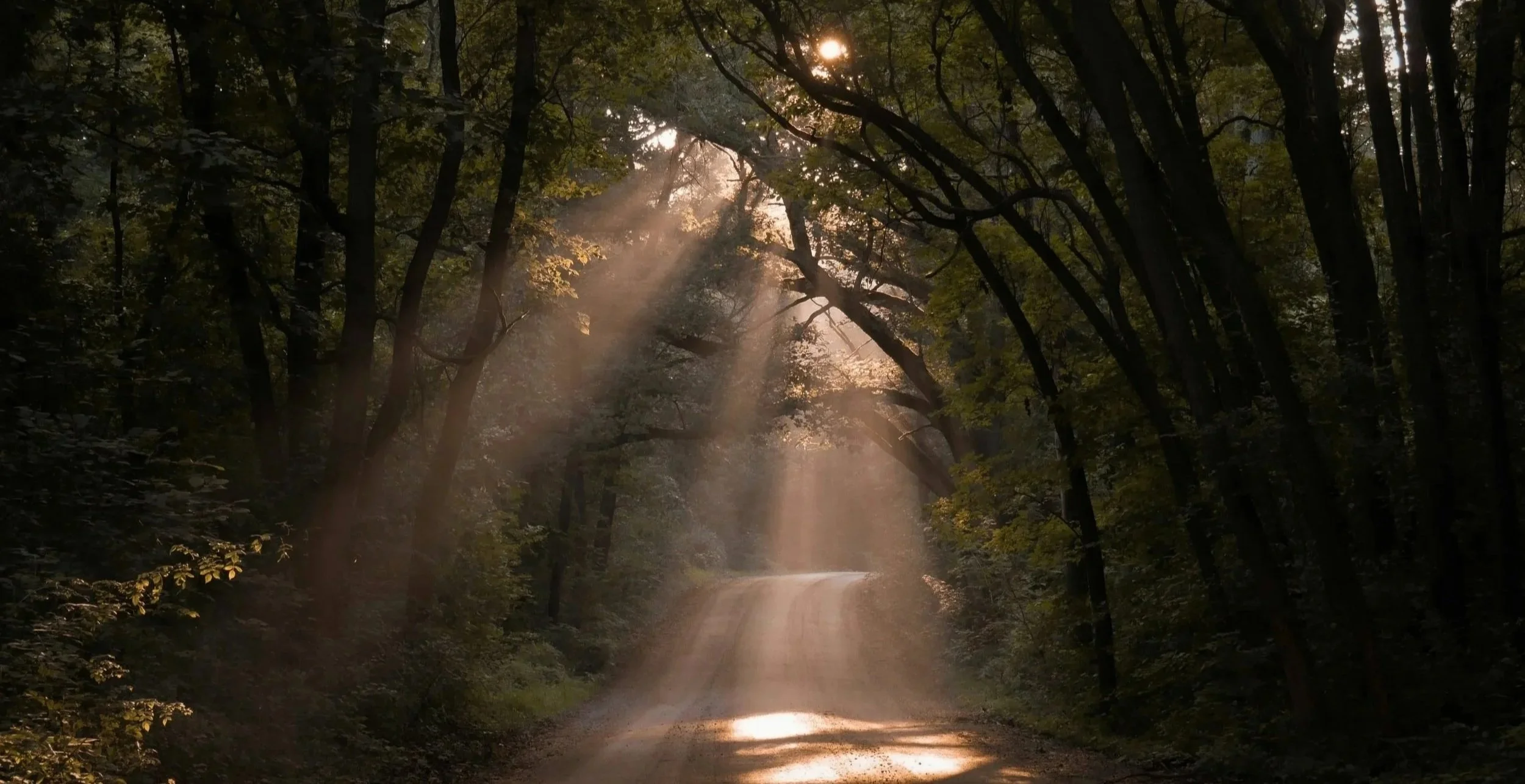Navigating Change
How the Two Loop Model guides the Eco-index journey toward a nature-positive future
At Eco-index, we work alongside land managers in iwi, councils, government, businesses, and NGOs who all face the same challenge: how do we transition from the modern system that depletes our natural world, to one that restores it? This question drives everything we do, from our tech like ecosystem mapping and decision-support tools, to who we partner with.
The Berkana Two Loop Model, developed by Margaret Wheatley and Deborah Frieze, depicts the transformation we're witnessing across Aotearoa and the globe. This model helps us understand how change is happening and where we fit in this journey from the old system to a new one.
Understanding the Two Loops
The model shows two overlapping loops, one representing the existing dominant system, the other representing a new system emerging as the old declines and is composted.
The upper loop represents the current dominant system - how we manage land, make decisions about natural resources, and balance economic and environmental priorities. As with all systems, there is a rise, peak, and eventually decline. As systems near their peak, turbulence appears, signaling the onset of decline.
We see this turbulence everywhere today:
Mainstream farming practices struggling with depleted soil and impacts of extreme weather events
Urban development removing ecosystems even while communities demand more green space
Decision-making processes failing to account for ecological impact as environmental and economic crises mount
Stewards within these systems work hard to maintain system stability as long as possible. Eco-index collaborates with many of these stewards: government council staff pushing for better environmental outcomes within existing regulation frameworks, agricultural organisations implementing mostly mainstream practices, and business leaders seeking to reduce their environmental footprint within current market structures.
The lower loop represents the new system emerging from the decline and composting of the old. This is where Eco-index sees the most exciting developments in our work. Turbulence in an existing system drives innovators to "walk out" - turning from the mainstream approach to create something different. Examples of innovators in the emerging system in Aotearoa NZ include:
Iwi groups reclaiming kaitiakitanga and implementing indigenous ways of knowing and working
Agricultural organisations incorporating regenerative agriculture
Government organisations considering nature-based solutions
Businesses recognising their inherent dependencies on the natural world and exploring models that prioritise ecological health, and creating space for markets that incentivise this
Funders looking for innovative, holistic initiatives with measurable outcomes that benefit nature and society
Initially, these innovators often work in isolation and their ideas can be dismissed as impractical or unrealistic. But when they connect with each other, they form networks that build trust, share knowledge, and grow the new system.
At Eco-index, we see our role as an innovator to nourish these networks as they grow into communities of practice. We help groups to understand their natural landscapes in new ways, identify opportunities for collaboration, make evidence-based decisions, and measure the outcome of their investment in a new system, where nature is cherished.
Eco-index as a science and mātauranga based organisation is integrating frontier technologies to optimise investment and resource nourishment into nature.
They are providing translatable tools and data into the hands of communities and nature-positive-aiming businesses so that we, as communities, as businesses, as people in service to Papatūānuku, can be enabled to act with more assurance, with more useful context, in right relationship with nature and with our widening communities of praxis, to re-establish nature positive ways of being - together.
Being in right-relationship can be easy to conceive at a personal level, but working in complexity of challenging system change will take more visibility and collective sense making then we are currently tooled up to conceive – Eco-index wants us all to be best enabled to support the healing of ourselves and this beautiful planet Earth, Papatūānuku, otherwise known as home, as us.
— Jan Hania, Eco-cultural Restoration Enabler.
Illuminating What's Possible
As communities mature, illuminators emerge who shine light on possibilities and transform communities into systems of influence. We've witnessed this repeatedly, a small restoration project becomes a model for an entire region, a single farm’s regenerative practices inspire neighbors, iwi-led initiatives demonstrate new collaborative approaches to resource management, or funders’ calls to action catalyse innovative thinking and bold new approaches to business-as-usual.
Our digital products are tools which can support this illumination:
Navigator X visualises complex environmental data, simplifying project prioritisation
Our Ecosystem Service Valuer supports and justifies investment in nature
Observer provides remote monitoring of native forest extent over large areas, generating the data needed for baselining, reporting and verification quickly and frequently
The Transition
The transition phase is when resources and people flow toward proven innovations in the new system, and is perhaps the most critical moment in the Two Loop Model. The old system can offer resources to help the new system grow, creating conditions for widespread transformation.
At Eco-index, we want to help facilitate this transition, bringing together robust science with practical, forward-thinking tools. Our partnerships with organisations like Taranaki Mounga Project and Mangaroa Farms represent steps towards a transition phase.
Looking Forward
The Two Loop Model reminds us that transformation is not just possible - it’s already happening. Across Aotearoa NZ, we're witnessing the emergence of new approaches to land management, nature investment, and community engagement. Our role is to provide the data and tools that help these innovations take root and grow.
The future we're working toward isn't just about better environmental outcomes - it's about an entire system that inherently supports the wellbeing of both people and place. We're guided by our vision of Weaving knowledge and people to revolutionise investment for Te Taiao.
Does this philosophy resonate with you?
We invite you to join this movement - spread the word about these emerging innovations and help others see what's possible!
Together, we can accelerate the transition toward a nature-positive future.


